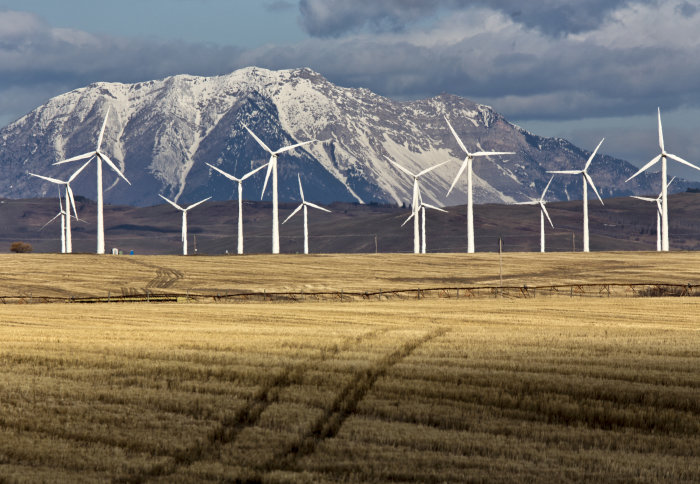Q&A: Alyssa Gilbert on Canada, collaboration and climate change

(Credit: boblobaw / iStock)
The challenges of tackling climate change in Canada, and the opportunities it can bring, are on the agenda in Alberta
Alyssa Gilbert, Director of Policy and Translation at the Grantham Institute – Climate Change and the Environment, has just returned from a trip to Alberta in Canada, where she met with different government bodies, businesses and universities to discuss the challenges of tackling climate change in Canada and the opportunities it can bring.
To limit the average global temperature rise to two degrees Celsius, as stipulated in the Paris Agreement, countries must substantially reduce their greenhouse gas emissions, such that emissions from human activities are net-zero by 2070. The Grantham Institute is working with policymakers, business leaders and researchers to evaluate decarbonisation pathways and help make the transition to a low-carbon future.

Alongside representatives from the UK’s Foreign and Commonwealth Office (FCO) and LSE’s Grantham Research Institute (pictured above*), Ms Gilbert shared some of the climate change and environment research carried out at Imperial, and discussed how academics can work with policymakers and industry. Following her trip, we caught up with her to find out more.
*Pictured above: Jim Dewald, dean of the Haskayne School of Business, University of Calgary; Caroline Saunders, British Consulate General; Maria Carvalho, Policy Analyst, Grantham Research Institute, London School of Economics and Political Science; Alyssa Gilbert, Director of Policy and Translation at the Grantham Institute, Imperial College London; Nathan Maycher, Director Climate Change and Sustainability Integration, Suncor; John Loughhead, Chief Scientific Advisor at the Department of Business, Energy and Industrial Strategy, Government of the United Kingdom
Why is it particularly challenging for Canada when it comes to moving to a low-carbon economy?
I met with a great number of people who would like to be part of a well-managed transition to a cleaner, healthier Albertan economy. Alyssa Gilbert Head of Policy and Translation, Grantham Institute for Climate Change and the Environment
Some parts of Canada are very dependent on the oil and gas sector. In Alberta, it is estimated that over 6% of workers are employed in the oil and gas sector – that’s over 140,000 people directly employed plus many more indirectly dependent upon it, not to mention the importance of oil and gas royalties to the Government budget. My hosts told me that recent low oil prices have led to a recession in the province, with a fall in GDP of 7.5%. The economy is now growing and recovering but nearly 30% of commercial building space in Calgary is still empty. There is widespread acceptance of the urgent need to diversify the economy but, understandably, moving towards a zero-carbon economy for Canada raises serious questions for many communities in Alberta. This agenda also creates a polarised atmosphere between groups that could be crudely categorised as either pro or anti oil and gas. Yet in reality, I met with a great number of people who would like to be part of a well-managed transition to a cleaner, healthier Albertan economy.
Furthermore, across Canada there is tension over the inclusion, or otherwise, of First Nations people. The government is navigating a legacy issue over the relationship between settlers from Europe and indigenous people. This adds a layer of complexity to climate and environment policy, ranging from the cultural elements of environmental and planetary stewardship, to concrete issues related to the ownership of land and natural resource rents.
How is it different to the challenges faced by the UK?

Since 1990, economic growth in the UK has been successfully decoupled from growth in greenhouse gas emissions – in 2017, UK carbon emissions fell to levels last seen in 1890. However, this is only part of the picture. Many of the products we use in the UK are manufactured abroad so, in a sense, we ‘offshore’ manufacturing-based, or ‘production’ emissions to other countries. In contrast, Alberta is, to some degree, the resource engine for the whole of Canada – and as a result, has significant production emissions to account for. That’s why it is so important that we take a global perspective and collaborate across borders to drive down global levels of greenhouse gas emissions.
Both the UK and Canada have large natural fossil fuel resources – in the North Sea and Alberta respectively. The skill set associated with fossil fuel extraction in these areas have excellent potential applications in low-carbon sectors, such as wind power, geothermal energy and carbon capture, use and storage (CCUS). If governments and industry develop a clear commitment, including financial incentives, a long-term policy framework and a credible business plan, to support new industries like these, then there would be many job opportunities for skilled workers – which should help to deflect fears that the decline of oil and gas will lead to unemployment.
Has there been much progress in the low-carbon transition so far? What are the stumbling blocks?

Last year, the Canadian Prime Minister Justin Trudeau introduced federal carbon pricing legislation, and at least six major environmental bills are expected in 2018 as part of the Pan Canadian Framework on Clean Growth and Climate Change. The ambition is there. However, as a country, Canada is pulled in multiple directions as each province tries different approaches to meet their climate goals. As a result, coordinated action is difficult.
Alberta itself has introduced an ambitious Climate Leadership Plan, which is particularly interesting given its role as an oil and gas producer. The Plan includes a $30/tonne carbon price, coal phase out and support for renewable energy electricity development, a cap on emissions from oil sands production and a target for methane emission reduction. However, as the Albertan economy is already deeply affected by low oil prices and the current controversy over a new pipeline for oil export from the province, the Plan has been met by a great deal of hostility from some quarters.
What opportunities are there for Canada in shifting to a low-carbon economy? How can climate change become a positive challenge?
With change, comes opportunity. In Alberta, government and industry can build on existing expertise in oil and gas to develop cleaner industries and technologies. For example, I met with Iron & Earth, a grassroots organisation that retrains those in the oil and gas industry to work in the nascent renewable energy sector, with the ultimate aim of creating a sustainable energy future for Canada.
I also heard about a number of initiatives to stimulate cleantech in Canada, like Emissions Reductions Alberta, which uses revenue from the carbon levy to invest in promising technologies and “propel them along the path of innovation from idea to market”. In fact, Imperial’s Centre for Cleantech Innovation was the subject of intense interest and a possible avenue of future collaboration.
How is Imperial collaborating with Canada? Do we have strong existing links?
My week of discussions unearthed many other great opportunities to embark on joint research projects Alyssa Gilbert Head of Policy and Translation, Grantham Institute for Climate Change and the Environment
The UK-Canada bilateral relationship provides an excellent context for collaboration. Specifically, in March 2016, the Alberta – UK Low Carbon Innovation and Growth Framework was agreed; and in September, the UK Canada Clean Energy Partnership was established, targeting active participation in the international Mission Innovation initiative. In the past, my Imperial colleague Dr Niall MacDowell was sponsored by the FCO to travel to Canada. He is now running a project sponsored by Canada’s Oil Sands Innovation Allianca (COSIA), which focuses on developing tools for the screening and development of advanced sorbents and solvents for carbon capture. This trip to Canada was sponsored by the FCO specifically to stimulate new research partnerships.
My week of discussions unearthed many other great opportunities to embark on joint research projects. The next step for me is to introduce the right researchers here, to many of the interesting people that I met, and encourage collaboration.

Finally, as a Canadian, what did you most like about returning?
It was the little things that really made me feel at home, like sun reflecting off piles of slightly-grey snow, the crisp and refreshing cold, an afternoon cross-country skiing, the smell and taste of Tim Horton’s Tim bits (for the non-Canadians, these are deliciously unhealthy donuts), and the friendly welcoming people.
To find out more about climate change and environment research at Imperial College London, sign up to the Grantham Institute weekly update.
Article text (excluding photos or graphics) © Imperial College London.
Photos and graphics subject to third party copyright used with permission or © Imperial College London.
Reporter
Lottie Butler
The Grantham Institute for Climate Change